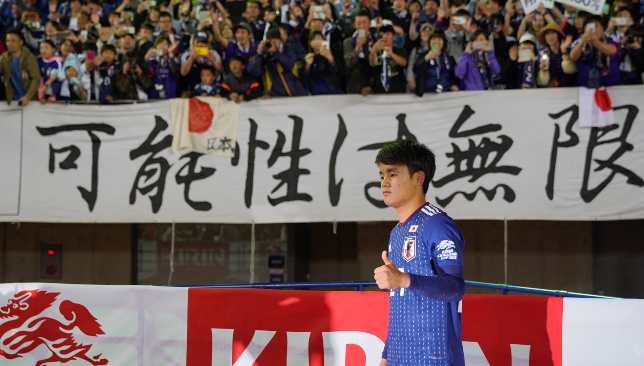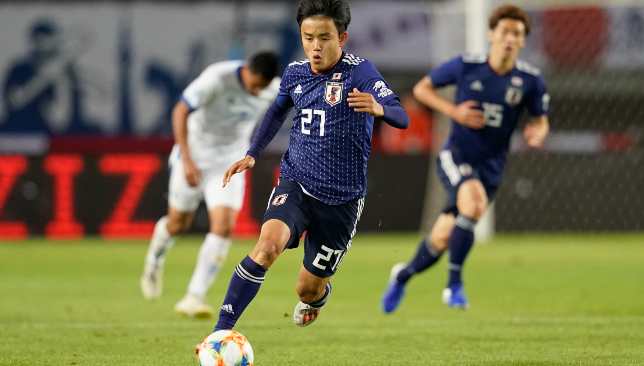
Ronaldo, Luis Figo, Luis Enrique, Javier Saviola, Michael Laudrup, Gheorghe Hagi. Some of the biggest names to ever play the beautiful game have had the luxury to call both the Camp Nou and Santiago Bernabeu home during their careers – but none of them had done so at 18.
OK, so Takefusa Kubo never actually played a senior game during four ill-fated years during his youth with the Blaugrana, and is yet to pull on the famous Los Blancos shirt either. But still, you’ve got to be a bit special to have straddled the El Clasico divide.
The teenager, known as the ‘Japanese Messi’, has just signed a €2 million deal with Madrid after his dream move to their fierce Spanish rivals Barca as a prodigious 10-year-old ended in disappointment, when he was forced back home in 2015 after the club was investigated for breaking FIFA regulations on signing young players.
Barca hoped to bring him back one day but it is Real who have now legitimately won his signature, handing Kubo a six-year contract believed to be worth €1m a season.
So, who is this latest Asian wunderkind? We take a look …
FACT FILE
Name: Takefusa Kubo
Age: 18
Date of birth: December 4, 1999
Birthplace: Asao-ku, Kawasaki, Japan
Height: 5ft 9in
Position: Attacking midfielder/forward

Kubo made his senior Japanese bow in a Copa America warm-up game against El Salvador last week.
Youth career
2008–2009 FC Persimmon
2010–2011 Kawasaki Frontale
2011–2015 Barcelona
2015–2017 FC Tokyo
Senior career Games Goals
2016–2018 FC Tokyo U-23 34 (5)
2016–2019 FC Tokyo 19 (4)
2018 Y’hama F Marinos (loan) 5 (1)
2019– Real Madrid 0 (0)
International Caps Goals
2015 Japan U15 5 (7)
2015–2016 Japan U16 12 (4)
2016–2017 Japan U17 7 (3)
2016 Japan U19 2 (0)
2017–present Japan U20 4 (0)
2019–present Japan 1 (0)
Who is he?
Kubo started playing football for FC Persimmon, based in his home city of Kawasaki, aged seven. A year later, in 2009, he was named MVP at a Barcelona soccer camp.
The following April he was selected as a member of a Barca school team and participated in the Sodexo European Rusas Cup in Belgium, again winning the MVP even though his team finished third. He joined Kawasaki Frontale’s youth team upon returning home.
Things really took off in August 2011 when he was invited to join Barca’s famed youth academy, La Masia, following a trial. He started out with Barca Alevin C (U11s) and, during his first full season (2012/13), finished as top scorer in the league with an incredible 74 goals in 30 games.
In his third full season (2014/15), he was promoted to Barca Infantil A (U14s). But the Catalan club was later found to have violated FIFA’s international transfer policy for under-18s, making Kubo ineligible to play for the club. He returned home in March 2015 and signed with FC Tokyo’s youth set-up, eventually graduating to their U23s and the senior team at only 15.
In December 2016, at the age of 15 years, five months and one day Kubo became the youngest player to play in the J.League.
On April 15, 2017, he became the youngest J.League scorer at 15 years, 10 months in a 1-0 win over Cerezo Osaka U23s.
Kubo has been involved in the Japan national team set-up all the way from U15s to senior level. He won his first cap last Sunday, June 9, when he came on as a substitute for Takumi Minamino in a pre-Copa America friendly – he is in the Samurai Blue squad for the tournament in Brazil – against El Salvador in Rifu, five days after his 18th birthday.
🇯🇵👋 Takefusa Kubo is a new @realmadrid player! He joins Castilla from next season. Welcome to the club, Takefusa! #HalaMadrid | #LaFabrica https://t.co/lIuJXksldA
— Real Madrid C.F. 🇬🇧🇺🇸 (@realmadriden) 14 June 2019
So what happened with the whole Barca/Real thing?
Kubo was singled out as a star of the future when he signed for the Blaugrana, aged 10, in 2011.
But, after four years in La Masia, Barca were served with a two-year transfer ban and players were de-registered and forced to return home. Among them were an American, a Cameroonian, two Dutch players, a Venezuelan, two French footballers, three Koreans and Kubo.
Barca kept tabs on him and had expected him to return after a successful spell in Japan, but instead he chose Madrid. And, according to reports in Japan, it wasn’t just down to the wages being offered by Los Blancos – but the fact that Real appeared to convince him they had more faith in his potential than Barca did.
The Catalan club reportedly offered him a two-year Barca B contract, with a developmental grade contract and wages, with no guarantee a first team contract would follow. Over in the capital, meanwhile, Madrid are said to have offered a five-year deal, with a professional contract and wages to match.
It is a similar situation to what Jadon Sancho faced when he chose Borussia Dortmund over staying at Man City, feeling he had a better chance of breaking through if he left the Premier League giants. Kubo will initially join the club’s B team, Castilla, but the plan is to incorporate him into the first team in his second season.
Where can he play?
Kubo earned the ‘Japanese Messi’ nickname for his sublime technical skills and dribbling ability – which made him a YouTube sensation – while at La Masia, and can play in either an attacking midfielder role or further forward.
He has an eye for both a pass and a goal, having scored five goals in 16 games in all competitions this year for Tokyo – including four in his last four J1 League appearances.
His early introduction to senior football back home has aided his physical transformation hugely – this year’s player guide lists him at 173cm and 67kg, an increase of 6cm and 7kg from when he was registered to Tokyo’s top team in September 2016.
What he says:
“Being called the Japanese Messi is an honour and makes me proud, but I’m still not at his level and I prefer to concentrate on my abilities and strengths,” said Kubo from Japan’s Copa America base in Sao Paulo.
“There are several players like me, but I’m me, not some other player,” he added, speaking impressively in Spanish.